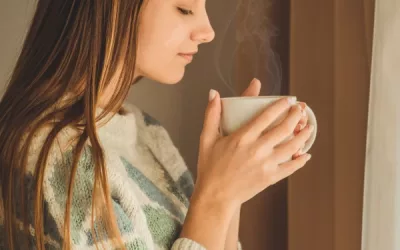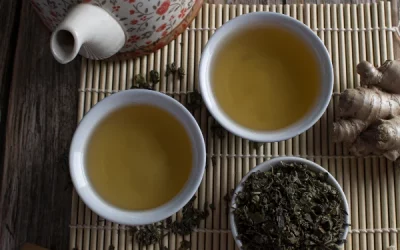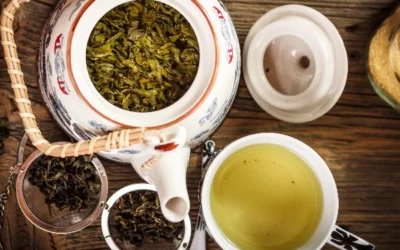Are you considering drinking green tea at night to improve your sleep and overall well-being? You’re not alone! Many adults seek natural remedies to enhance their nightly routine. In this article, I’ll dive into the benefits of sipping green tea in the evening, explore its relationship with sleep quality, and compare it to other teas better suited for nighttime. Plus, I’ll address concerns about caffeine content and potential side effects. If you’re eager to discover how this beloved beverage can enhance your night-time ritual, read on!
Table of Content
Can I drink green tea at night?
Drinking green tea at night can offer several advantages that promote relaxation and enhance your overall well-being. Green tea carries numerous health benefits owing to its antioxidant properties and the presence of compounds that can help reduce stress and improve sleep quality. Integrating green tea into your nightly routine may aid in unwinding after a long day and prepare you for a restful sleep.
When it comes to enjoying green tea in the evening, the key factors to consider include its calming effects, its rich antioxidant content, and its contribution to sleep and stress management. Let’s explore how green tea can be a beneficial addition to your nighttime routine.
How does green tea help with relaxation?
Green tea is known for its calming effects, which can make your evenings more peaceful.
- L-Theanine: This amino acid found in green tea promotes relaxation without causing drowsiness, making it easier to unwind.
- Reducing cortisol levels: Green tea can help lower cortisol levels, which are often linked to stress.
- Meditative quality: The ritual of brewing and sipping tea can be meditative, encouraging mindfulness.
- Warm beverage effect: Drinking a warm beverage can be inherently soothing to your body.
When you drink green tea, the presence of L-Theanine counteracts the stimulant effects of caffeine by promoting alpha brain wave activity, which is associated with a relaxed but alert state. This can help you relax and reduce mental fatigue. Additionally, green tea’s warmth and aroma offer a comforting ritual, enhancing the relaxation experience.
What antioxidants are present in green tea and their benefits?
Green tea may be packed with antioxidants, contributing to its myriad health benefits.
- Catechins: These antioxidants improve cardiovascular health and have anti-inflammatory properties.
- Epigallocatechin gallate (EGCG): Known for its powerful health benefits, including enhancing metabolism and protecting against cell damage.
- Flavonoids: These compounds support immune function and reduce oxidative stress.
- Vitamin C and E: These vitamins further bolster the body’s ability to fight off free radicals.
The catechins and EGCG found in green tea are particularly noteworthy. Catechins can protect cells from oxidative stress, which is linked to chronic diseases. EGCG is noted for its ability to support weight management and improve overall heart health. Flavonoids and vitamins C and E contribute to overall vitality, enhancing the protective benefits of green tea.
How does green tea improve sleep quality?
Green tea may assist in improving the quality of your sleep, despite its caffeine content.
- L-Theanine and GABA levels: L-Theanine increases GABA, dopamine, and serotonin, enhancing sleep quality.
- Low caffeine content: Compared to coffee, green tea has significantly lower caffeine levels, which can aid in falling asleep.
- Stress reduction: Lower stress levels can contribute to better sleep.
- Digestive health: Improving digestion can indirectly benefit sleep patterns.
L-Theanine again plays a crucial role here. By increasing the brain’s production of calming neurotransmitters, it helps prepare your body for sleep. Although green tea does contain caffeine, it is significantly lower than in other beverages, allowing many people to enjoy it in the evening without disrupting their sleep cycle. Stress reduction and improved digestion can also lead to a more restful night.
During the early 9th century, a Japanese Buddhist monk named Eisai travelled to China and brought back the habit of tea drinking to Japan. He documented the health benefits of green tea in his book “Kissa Yōjōki” (The Book of Tea), which includes references to its calming and medicinal properties. Eisai’s teachings helped popularise the drink among Japanese samurai and nobility, establishing green tea as both a cultural and health-promoting staple.
Personally, my nightly ritual sometimes involves green tea especially after a hectic day dealing with work and family responsibilities. The act of brewing a cup helps me shift into a more relaxed state.

What is the optimal time to drink green tea before bed?
Alright, let’s talk about what everyone desperately wants to know – can you slurp on that “healthy elixir” called green tea just before hitting the sack? Well, the answer isn’t as simple as a yes or no. This is because green tea, that wonder herb, comes with a sneaky little spy called caffeine. Yep, that same fella which gives you a jolt in your morning cuppa.
Understanding the impact of caffeine absorption, individual sensitivity levels, and expert opinions can help you figure out the ideal time to imbibe that soothing, hot cup of green goodness before bed without turning into an insomniac owl.
Green tea contains a moderate amount of caffeine, typically around 20-50 mg per cup. While this might seem trivial compared to coffee’s hefty caffeine punch, it’s enough to make those eight hours of peaceful sleep quite elusive. However, with fine-tuned timing, you can still enjoy your tea without transforming into a sleepless zombie.
How long does it take for caffeine to affect the body?
Think of caffeine as that guy at a party who shows up fashionably late but makes a grand entrance. It takes about 15-45 minutes to crash your system fully. But here’s the kicker – its effects can last anywhere between 3 to 5 hours, sometimes more. Let’s break that down:
- Absorption Time: 15-45 minutes to hit its peak performance.
- Half-Life: Sticks around in your system for 3-5 hours.
- Impact Duration: Maybe up to 6 hours, depending on individual metabolism.
- Residual Effect: Some folks might feel the buzz even longer.
So, if you’re prone to overthinking and bedtime struggles already, probably best to give your liver a fighting chance to process all that caffeine. Slurp your last delightful sip ideally 6 hours before your head hits the pillow.
What factors influence individual sensitivity to caffeine?
Now, not all tea drinkers are made equal. Some can chug an espresso and sleep like a log, while others sniff a latte and toss all night. Factors affecting your caffeine sensitivity include:
- Genetics: Some folks have the genetic disposition to metabolise caffeine faster.
- Age: The older you are, the slower your body processes caffeine.
- Body Mass Index (BMI): Lower BMI might mean caffeine affects you more.
- Hormones: Ladies, you might be more sensitive during certain times in your menstrual cycle.
- Regular Intake: Habitual drinkers might build a tolerance while occasional drinkers might feel hyperactive.
- Stress Levels: Higher stress levels might amplify caffeine’s effects.
So, your tea-drinking neighbour might be dozing off with their green tea nightcap, while you might be counting sheep till dawn. Know thyself!
What is the general recommendation for drinking green tea before bed?
Alright, drumroll, here’s the expert take – sip your green tea 2-6 hours before bedtime. This timing helps the caffeine do its job without interfering with your deep slumber. Here’s a quick rundown:
- 2-6 Hours Before Bed: To avoid caffeine-induced insomnia.
- Decaffeinated Green Tea: If you’re super sensitive but still crave that leafy goodness.
- Chamomile Addition: Blend it with chamomile to mellow the caffeine impact.
- Post-Dinner Brew: Have it right after dinner for enjoyment without the insomnia.
- Monitor Effects: Track how it affects your sleep pattern to find your sweet spot.
So, enjoy your tea earlier in the evening. It’s like having your cake and eating it, too – without the sleepless sacrifice.
In the 17th century, a cheeky fellow named John Evelyn, an English writer, and garden enthusiast, penned down the many virtues of green tea in one of his numerous diaries. He recommended drinking it for its myriad health benefits but never before bed.
Because even in the 1600s, they knew better than to mess with sleep – after all, even back then, people carried the weight of tomorrow. So, learn from John, sip wisely, and sleep soundly.
Are there any side effects of drinking green tea at night?
Let’s cut to the chase: Yes, there are some side effects of drinking green tea at night. Most people view green tea as a magical potion, worshipped for its antioxidants and weight loss benefits. But when it comes to sipping this green elixir before bed, it’s a different ballgame. Let’s dig into the juicy details, shall we?
Experts often sing the praises of green tea, but they also raise their eyebrows when it’s enjoyed too late in the day. Green tea contains caffeine, the same buzz-inducing stuff found in coffee and energy drinks – and this can mess with your beauty sleep. Then there’s the digestive drama, which some unlucky souls experience. And of course, not everyone reacts the same way, because we’re all beautifully unique, like snowflakes, right?
You’d think green tea couldn’t pack a punch, but don’t be fooled by its mild-mannered appearance. Caffeine is its hidden weapon. Drinking it at bedtime can lead to the following:
- Insomnia: Staring at the ceiling counting sheep when you could be dreaming.
- Restlessness: Feeling jittery and unable to relax.
- Increased heart rate: Perfect if you’re planning to run a marathon, not so great for snoozing.
- Delayed sleep cycles: The ol’ disruptor of natural sleep rhythms.
All this caffeine business can make you feel like you just consumed a double espresso. So, if you’re aiming for a good night’s sleep, it might be wise to keep a safe distance from green tea in the evening.
Can green tea cause digestive issues when consumed at night?
Now, let’s talk about the diva-like tendencies of your digestive system. Green tea might be tough on those with sensitive tummies. Drinking it at night can lead to:
- Stomach upset: That annoying rumble in your belly.
- Acid reflux: Burning sensations that rise up like a bad karaoke performance.
- Nausea: A general feeling of yuck.
- Bloating: The Michelin man look isn’t flattering.
These inconveniences can be attributed to the tannins in green tea, which increases stomach acid production. If your digestive system decides to throw a tantrum, you’re in for a rough night.
How do individual differences affect the side effects of green tea?
Here’s the wildcard: everyone’s body is different. Your friend may guzzle green tea at midnight and sleep like a baby, while you lie awake plotting their downfall. Why? Because individual reactions to green tea vary:
- Caffeine sensitivity: Light sleepers versus heavy sleepers.
- Metabolism speed: Some burn it off faster than others.
- Stomach sensitivity: Some tummies are tougher than others.
- Overall tolerance: The more you’re used to it, the less you’ll feel its effects.
Think of it like being on a team – everyone has their unique strengths and weaknesses. Knowing how your body handles green tea can save you a lot of trouble.
Not too long ago, monks in ancient China sipped green tea to stay awake during long meditations. They knew it had a kick to keep them alert and focused. Imagine sipping a cup in a cold, serene monastery, trying to reach enlightenment rather than drift into slumber. That’s right, if monks used it to stay awake, maybe it’s a sign to keep it far, far away from your nighttime routine.
So, the next time you reach for that calming green tea before bed, think twice. Your body will thank you, and the sheep can go back to grazing.
How does green tea compare to other teas for night-time consumption?
Ah, green tea. The elixir of many an ambitious health enthusiast. But is it the bedtime buddy you’ve always dreamed of, or a late-night troublemaker? Let’s cut through the nonsense and figure this out.
First off, there’s more to this tea business than meets the eye. Sure, green tea has its perks—loads of antioxidants, potential weight loss benefits, and even a reputation for prolonging the human lifespan (well, maybe not that last one, but close).
However, when it comes to night-time sipping, we have to scrutinize a few crucial factors like caffeine content, calming effects, health benefits, user preferences, and what the experts blabber on about.
How does the caffeine content of green tea compare to other teas?
Now, for everyone who’s ever asked, “Can I drink green tea at night without bouncing off the walls like a caffeinated squirrel?” Here’s what you need to know about the caffeine game.
- Green Tea: Moderate caffeine content, about 20-40 mg per cup. Enough to keep you from snoring in meetings but potentially disruptive to your midnight Zs.
- Black Tea: The rockstar of wakefulness with 40-70 mg of caffeine per cup. Definitely not your go-to if you’re counting sheep.
- White Tea: The zen master of the tea world, around 15 mg. Slightly better than green for pre-bedtime sipping.
- Herbal Teas (like Chamomile): Zero caffeine. Nada. Perfect for winding down without any secret jittery plans.
So, green tea sits somewhere in the middle—not enough to ruin your sleep entirely, but don’t binge-drink it thinking it’s harmless as water. Moderation, my friends.
What are the calming effects of different teas?
Alright, caffeine is just one piece of the puzzle. Let’s talk chill vibes. After all, the goal here is to drift into restful slumber, not start a one-person party at 3 AM.
- Green Tea: Contains theanine—an amino acid associated with relaxation and reducing stress. Yet, the caffeine makes it a double-edged sword.
- Black Tea: Typically more of a “get-up-and-go” rather than “let’s relax,” thanks to higher caffeine.
- Peppermint Tea: Super soothing, and caffeine-free. Perfect for calming the mind.
- Chamomile Tea: The reigning champion in the sleepy time department. Known for its mild tranquilising effects. Think of it as the teddy bear of teas.
So yes, green tea offers some calming effects due to theanine, but it’s not the heavyweight champion in this category.
Which tea is most recommended by experts for night-time consumption?
Now, what about the professionals who wear white coats and write about these things?
- Chamomile Tea: The crown prince of night-time teas, consistently recommended for its ability to aid sleep and reduce anxiety without a hint of caffeine.
- Peppermint Tea: Another expert favourite—it’s calming and great for digestion. A win-win.
- Green Tea: Experts often suggest switching to a decaffeinated version if you insist on sticking with green. You can still get the benefits minus the sleep disruption.
- Lavender Tea: Ah, lavender! A newcomer, but growing in reputation for its relaxing properties and pleasant aroma.
Clearly, experts aren’t picking green tea as their first night-time choice. They’re more likely to recommend chamomile or peppermint, but they won’t judge you harshly if you go for a decaf green tea option.
Can I drink green tea at night?
Alright, folks, let’s talk about green tea and its role in your nighttime routine. The big question is: “Can I drink green tea at night?” A straightforward answer is yes, but it’s not that simple. Using green tea as part of your bedtime habits can be a game-changer if done right. Let’s dive in and see how.
Green tea isn’t just a miracle brew for your morning energy boost; it can also be a stellar companion to your nightly wind-down. Packed with L-theanine, an amino acid known for its relaxing effects, green tea can help you chill. However, it does contain caffeine. So, if you’re sensitive to caffeine, you might want to give it a couple of hours before hitting the sack. This way, you’re more likely to enjoy the calming benefits without a midnight staring contest with your ceiling.
What relaxation techniques can complement drinking green tea?
So, you’ve brewed your late-night cup of green tea, and you’re ready to unwind. But why stop there? Pairing your beverage with other relaxation techniques can supercharge your nighttime routine.
- Deep Breathing Exercises: Take a few minutes to focus on your breaths. Inhale through your nose, hold for a moment, and then exhale slowly through your mouth. This can amplify the relaxing benefits of your tea.
- Mindful Meditation: Clear your mind by focusing on the present moment. Sit comfortably, sip your tea, and let the calming properties take over.
- Yoga or Stretching: Some gentle yoga or simple stretches can help release the tension built up during the day, making you feel more relaxed.
- Reading a Book: Pick up that novel you’ve been meaning to read. Just avoid that suspense thriller—you don’t want your heart racing before bed.
- Listening to Calming Music: Play some soft, soothing tunes as you sip your tea. This can set the stage for a restful sleep.
Adding these techniques makes your green tea experience a holistic one, targeting both your mind and body.
How can green tea be part of a bedtime ritual?
Creating a bedtime ritual can be soothing, much like a lullaby for adults. Incorporating green tea into this routine can give it an extra calming touch.
- Set a Time: Make it a habit to drink your green tea at the same time each night. This trains your body to start winding down.
- Create a Cozy Spot: Pick a comfortable place—a nook in your living room, or maybe a balcony. Surround yourself with pillows and soft lighting.
- Pair with Other Rituals: Combine your tea time with another relaxing activity like a warm bath or some light reading.
- Use a Special Cup: Elevate the experience with a special mug that you only use for your nighttime tea. It’s amazing how a favourite cup can make the experience feel more special.
- Unplug from Screens: Make your green tea time a digital detox period. Put away your gadgets to fully engage in your ritual.
Incorporating green tea into a series of small, deliberate actions can signal to your body that it’s time to wind down.
What do experts recommend for a healthy bedtime routine?
Experts have a wealth of recommendations for a relaxing bedtime routine, and guess what? Green tea often makes the list.
- Limit Caffeine: While green tea contains caffeine, experts recommend drinking it at least a couple of hours before bed to prevent sleep disruption.
- Establish a Routine: Creating a consistent pre-sleep routine can help signal to your body that it’s time to sleep. Irregular bedtime habits can confuse your internal clock.
- Stay Hydrated: But don’t overdo it. A moderate amount of green tea can keep you hydrated without those dreaded midnight bathroom trips.
- Avoid Heavy Meals: Experts suggest avoiding heavy meals before bedtime. A light snack accompanied by green tea can be soothing.
- Environmental Control: Maintain a cool, quiet, and dark environment in your bedroom. This complements your internal preparations and helps you fall asleep faster.
Drinking green tea as part of a comprehensive, expert-backed bedtime routine can help optimise your sleep quality.
During the Edo period in Japan, monks at Zen temples discovered the calming effects of green tea. They would drink it to stay alert during long meditation sessions without the jitteriness that other caffeinated drinks might cause. This practice not only helped them focus on their spiritual training but also laid down the foundations for modern tea rituals. So, by adding green tea to your bedtime routine, you’re essentially tapping into an age-old tradition designed for relaxation and mindfulness. How’s that for a restful night?
Can I drink green tea at night?
So, you’ve had a long day. Maybe you’ve defeated your arch-nemesis at the office, or perhaps you’ve survived another toddler tantrum without losing your sanity. Now, you want to unwind, but with all the hype around green tea being the elixir of life, you’re contemplating switching your chamomile with it. But hold your kettle! Can you drink green tea at night?
Let me spill the (green) tea. Yes, you can drink it at night, but whether you should is another kettle of fish. The thing is, green tea contains caffeine, albeit in smaller amounts than your cup of joe. Caffeine is like that friend who shows up uninvited to your chill night with an endless supply of energy. Just when you thought you were ready for a good night’s sleep, here comes caffeine, ready to party. Not the best news for anyone with morning commitments.
What are the overall health benefits of drinking green tea?
Oh, green tea, you magical potion. If green tea had a Tinder profile, it would brag about its antioxidant effects, heart health benefits, weight management assistance, immune support boost, and mental well-being reinforcement. I mean, it’s practically a health influencer in a teacup!
How do the antioxidants in green tea benefit overall health?
Antioxidants are the unsung heroes in your green tea. These marvellous little guys keep those pesky free radicals in check, helping you stay healthy and radiant.
- Polyphenols: These are the special forces of antioxidants, reducing inflammation and even helping protect against chronic diseases.
- Catechins: They’re like the ninjas of the tea world, battling cellular damage.
- Reduced oxidative stress: Antioxidants help neutralize oxidative stress, which is a fancy term for cellular chaos that can lead to ageing and diseases.
- Enhanced skin: Forget those pricey creams; frequent green tea drinking can make your skin glow.
- Detoxification: Giving your body a spring clean by flushing out toxins.
So, sip away knowing you’re arming your body with nature’s shield against the wear and tear of life.
What is the impact of green tea on heart health?
Green tea and your heart might be like best mates. They look out for each other.
- Lowered blood pressure: Say goodbye to that old blood pressure monitor.
- Improved cholesterol levels: Green tea can help reduce bad cholesterol (LDL) and boost the good kind (HDL).
- Reduced risk of heart disease: A heart-healthier you means a longer, happier life.
- Blood sugar control: This helps lower the risk of developing type 2 diabetes.
- Anti-inflammatory effects: Keeping your blood vessels fit and flexible.
So, next time you’re enjoying a good brew, remember, it’s not just your taste buds that are happy; your heart is doing a little jig too.
How does green tea support weight management?
Everyone’s looking for an edge in the battle of the bulge, and green tea might be your not-so-secret weapon.
- Boosts metabolism: Green tea can give your metabolism a kick in the rear.
- Fat burning: Assisting your body in turning fat into energy.
- Appetite control: Helping you say no to that sneaky midnight snack.
- Lower calorie drink: It’s not packed with empty calories, unlike some other, more sugary options.
- Enhanced exercise performance: Improved endurance means you can work out longer and more effectively.
Green tea might not transform you overnight, but it’s a great sidekick in your weight management journey.
Way back in ancient China, around 2737 BC, Emperor Shen Nong discovered tea when leaves from a wild tree blew into his pot of boiling water. He was known for experimenting on himself with different herbs and plants. Imagine, one moment, he was just boiling water, the next, he was stumbling upon what would become a remedy revered for centuries. This tale reflects why green tea has stood the test of time, offering benefits ranging from skin health to heart health. Sip on that bit of history next time you enjoy your cup of green tea!
Conclusion
As I reflect on the multifaceted benefits of drinking green tea at night, it’s clear that this humble beverage is much more than a simple drink. From promoting relaxation through the calming properties of L-theanine to offering a wealth of antioxidants that assist in overall health, green tea can be a powerful ally in our quest for better sleep and well-being. The caffeine content, while a valid concern for many, can be navigated with an understanding of individual sensitivity and consumption timing, as detailed in the comparative table we explored.
The science supporting green tea’s role in alleviating insomnia is encouraging, with studies highlighting its potential to enhance sleep quality and reduce anxiety. Coupled with the anecdotal evidence from users who have found solace in its soothing properties, it’s apparent that green tea has carved out a niche as a worthy addition to our nighttime routines. While there are side effects to consider—primarily related to caffeine—being mindful of how our bodies react can help mitigate these issues.
In the grand scheme of things, integrating green tea into a holistic bedtime ritual aligns seamlessly with many expert recommendations for optimal health. As we seek natural remedies to improve our quality of life, this simple beverage deserves a place in our lives.
So, I leave you with this thought: could a cup of green tea before bed be the missing piece in your journey toward restful nights and rejuvenated mornings? As you ponder the benefits and adopt this practice, remember that the path to better sleep could be as easy as steeping a cup and relaxing.





